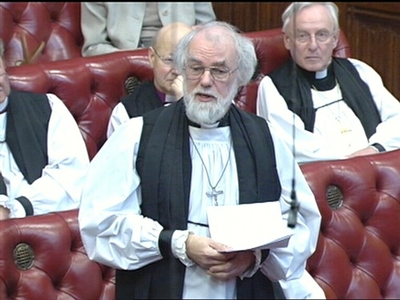23 May
2012
The Constitutional Importance of The Lords Spiritual
Posted in Christianity, Religion, Social Commentary
There is a consensus among the leaders of the main political parties that, when reformed, the House of Lords should retain a number who sit as Lords Spiritual. This ‘bloc’ of peers is made up of twenty-six Archbishops and Bishops of the Church of England. In a recent blog post it was argued that, were reform to the ‘upper’ Chamber to occur, it would be better for it to become an elite Chamber of the ‘best qualified’, containing men and women from a broad range of professional backgrounds. 
It is likely that removal of the Bishops has not been proposed on account of a potential constitutional quandary. The Church of England, as established, has an official role within the State. Bishops do not exercise any political office, nor are they obliged to act on the behest of government. However, as representatives of an established Church, they do provide a spiritual and moral dimension besides a ceremonial one. At the coronation of a monarch the Archbishop of Canterbury acts, so to speak, as an intermediary of God as well as of the State.
The former Bishop of Oxford, nominated a life-peer on retirement, has declared: ‘It is worth keeping the bishops because they act as a symbol of the Queen in Parliament under God. We say a prayer to indicate that Parliament is accountable not only to the electorate but to God.’ It can be argued that many of those who desire removal of the Lords Spiritual are actually seeking to disestablish the Church and thereby to have a more manifestly secular State. Such a policy cannot be beneficial or desirable for society.
It is often said, in the light of recent societal developments, that structure and security have been weakened and contributed to a diminution of local and national common purpose. It is generally agreed that the recent riots on the streets of Birmingham, Manchester and London were consequences of such developments. It has also been long recognised, even by some non-believers, that religion provides a structured moral code that sustains a sense of security and common purpose. In this sense the established Church contributes to a cultural identity and to a sense of continuity with those who have gone before. In this respect, it might be argued that the established Church plays a role on a par with those of the Monarch and Parliament itself.
Both the atheist philosopher Alain de Botton and the political scientist Robert Putnam have recently published books recognising the communal nature of religion as important in providing security and stability. A religion does not, of course, need to be established in order to provide this on a localised level, but the Church of England as established does in some measure offer it on a national basis. It is important for a nation to have a sense of common purpose via some common and shared cultural identity. The Lords Spiritual should be retained.
Leave a Reply